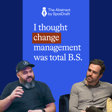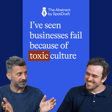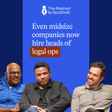
Navigating Ownership Transitions From PE to Public Holdings: Brian Chase, GC, ServiceChannel
Mergers and acquisitions, private equity buyouts, and transformative deals are part of business. But what's it like for the lawyers making them happen?
Get an insider look at high-stakes corporate transformations from Brian Chase, GC of ServiceChannel. Brian shares a candid glimpse into the complexities behind major corporate moves as he delves into his experiences navigating company changes under different owners, handling new responsibilities, and adapting to shifting corporate structures along the way.
We also discuss:
— what it means to be “more than just legal” as a general counsel,
— what it’s like to work at an early-stage company and set the foundation for the legal team,
— how to overcome budget constraints and train your team members to fill the gaps in your team, and more.
Read detailed summary: https://www.spotdraft.com/podcast/episode-12
Topics:
Introduction: 00:00
Navigating transitions in ownership structures and responsibilities: 01:13
Lack of communication leading to frustration regarding desired roles and responsibilities: 07:30
Being the GC of a subsidiary in a public holdings company: 10:03
Building internal credibility and expanding beyond legal: 12:14
Identifying your strengths and weaknesses, and communicating them: 15:39
Brian’s experience as employee #31 at Foursquare: 20:03
The importance of networking in growing your career and opening up to opportunities: 26:00
Training people up to fill gaps in your team and overcome budget constraints: 30:41
The evolution of the structure of in-house legal teams: 33:36
Concluding questions around failures and learnings: 37:09
Resources mentioned in the episode:
Take the StandOut Assessment: https://www.tmbc.com/standout-assessment/
Register for the SpotDraft Summit 2023: https://www.spotdraft.com/spotdraft-summit-2023-newyork
Connect with us:
Brian Chase - https://www.linkedin.com/in/brian-r-chase/
Tyler Finn - https://www.linkedin.com/in/tylerhfinn
SpotDraft - https://www.linkedin.com/company/spotdraft
SpotDraft is a leading CLM platform that solves your end-to-end contract management issues. Visit https://www.spotdraft.com to learn more.



















